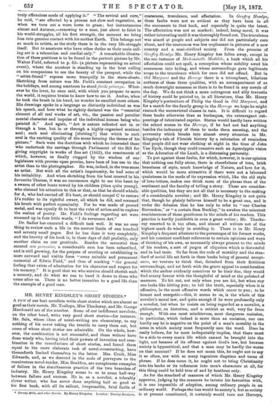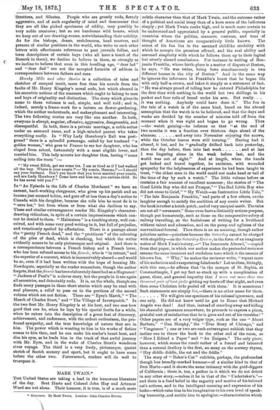MR. HENRY KLNGSLEY'S SHORT STORIES.•
A FEW of our best novelists write short stories which are almost as good as their novels. Mr. Trollope, Miss Thackeray, and Mr. George Macdonald are of the number. Some of our indifferent novelists, on the other hand, write very good short stories—for instance, Mr. Sala, whose ideas of novel-writing are elementary, to say nothing of his never taking the trouble to carry them out, but some of whose short stories are admirable. On the whole, how- ever, the combination is not successful, and those writers have done wisely who, having tried their powers of invention and com- bination in the manufacture of short stories, and found them equal to the more elaborate task of novel-constructing, have 'thenceforth limited themselves to the latter. Mrs. Craik, Miss Edwards, and, as we descend in the scale of purveyors to the omnivorous novel-reader, Miss Braddon, are conspicuous examples of failure in the simultaneous practice of the two branches of industry. Mr. Henry Kingsley seems to us to come half-way between failure and success. He is, as a novelist, a tolerably clever writer, who has never done anything half so good as his first book, with all its salient, irrepressible, fatal faults of
• Hornby Mills, and other Stolies. By Henry Kingsley. London: Tinsley Brothers.
coarseness, truculence, and affectation. In Geogry Hamlyn,
these faults were not so evident as they have been in all
the successors to that book, and especially in quite the latest. The affectation was not so marked; indeed, being novel, it was rather interesting until it was thoroughly found out. The truculence was aimed at people and subjects one did not particularly care about, and the coarseness was less unpleasant in pictures of a new country and a semi-civilized society. From the promise of Geof•y Hamlyn Mr. Henry Kingsley has fallen away, except in the one instance of Mademoiselle Mathilde, a book which all his affectation could not spoil, a conception whose nobility awed his coarseness into hiding, and whose surroundings gave legitimate scope to the truculence which for once did not offend. But in Old Margaret and the Herveys there is a triumphant, hilarious outburst of these three qualities, with an accompaniment of as much downright nonsense as there is to be found in any novels of the day. We do not think a more outrageous and silly travestie of history could be pointed to, in all literature, than Mr. Henry Kingsley's portraiture of Philip the Good in Old Margaret, and for a match for the family group in the Herveys we hope he might ransack the unconvicted classes in vain. It is difficult to regard these books otherwise than as burlesques, the extravagant out- pourings of intoxicated caprice. Sterne would hardly have written the school scenes in the Herveys, if he had not had anything besides the indecency of them to make them amusing, and the perversity which breaks into almost every situation in Mr. Kingsley's tale of Flemish history by a reiteration of reminders that people did not wear clothing at night in the time of John Van Eyck, though they could conceive such an Apocalyptic vision as the Adoration of the Lamb, is a distressing perversity.
To put against these faults, for which, however, it is our opinion that nothing can fully atone, there is cheerfulness of tone, brisk breeziness of style, much knowledge of Nature, and love for it, which would be more attractive if there were not a laboured quaintness in the mode of its expression which, like the old style of love-letters, makes one think more of the phrase than of the sentiment and the faculty of telling a story. These are consider- able qualities, but they are not all that is necessary to the making of a considerable novelist ; and Mr. Henry Kingsley is not quite that, though he plainly believes himself to be a great one, and is under the delusion that he has only to refer to " one Charles Ravenshoe," or " a certain Sam Buckley," to awaken the minutest reminiscences of those gentlemen in the minds of his readers. This practice is hardly justifiable in even a great writer ; Mr. Thacke- ray resorted to it too often, and almost all writers not of the highest mark do wisely in avoiding it. There is in Mr. Henry Kingsley's frequent allusions to the personages of his former works, and his constant confident references to certain opinions and ways of thinking of his own, as necessarily always present to the minds of his readers, a sort of jargon of cliqueism which is distasteful and in bad taste. So far from the code of morality and the stan- dard of social life set forth in these books being of general accept- ance, we venture to think that, detached from their fictitious surroundings, and set forth with the grave appeal to consideration which the author evidently conceives to be their due, they would find scanty favour with the thoughtful of mind or the polished of manners. To hit out, not only when you are hit, but when any one looks like hitting you ; to tell the truth, especially when it is offensive, in the most offensive words which occur to you; to be honest and energetic—this, it seems to us, is the whole of this novelist's moral law, and quite enough if he were professedly only a novelist, but when he insists on being regarded as a moralist, a philosopher, an historian, and a satirist as well, very far from enough. With one most mischievous, most dangerous omission, in particular, which indeed is more than an omission, one can hardly say he is negative on the point of a man's morality in the sense in which society most frequently uses the word. Does he really believe, for he most indisputably implies, that there must be a side to every man's life which cannot be brought into the light, not because of its offence against God's law, but because society is hypocritical, and that a man may be hardly the worse on that account? If he does not mean this, he ought not to say it so often, nor with so many ingenious disguises and turns of phrase. If he does mean it, he ought not to bring Christianity into his books or its influences into men's characters at all, for this thing could be held true of and by heathens only.
As for the standard of manners of which Mr. Henry Kingsley approves, judging by the manners he invests his favourites with, it is one impossible of adoption, among ordinary people in an ordinary world. Perhaps the loss would be society's, but as society is at present constituted, it certainly would turn out Herveys, Strettons, and Silcotes. People who are grossly rude, fiercely aggressive, and of such angularity of mind and demeanour that they are all like picked specimens of oddity, may possibly be very noble creatures ; but so are handsome wild beasts, which we keep out of our drawing-rooms, notwithstanding their nobility. As for the bishops, deans, archdeacons, head masters, and persons of similar positions in the world, who write to each other letters with affectionate references to past juvenile follies, and terse descriptions of certain boys (who all have a touch of the Berserk in them), we decline to believe in them, as strongly as we incline to believe that even in this levelling age, " dear lad" and "dear dad" are not the accepted formula: of address in correspondence between fathers and sons.
Hornby Mills and other Stories is a collection of tales and sketches of unequal merit, more free than his novels from the faults of Mr. Henry Kingsley's moral code, but which abound in his eccentric notions of the manners which ought to belong to men and boys of originality and distinction. The story which gives its name to these volumes is sad, simple, and well told ; and is, indeed, merely a frame-work for a lecture on flower-gardening, which the author understands, and makes pleasant and interesting. The two following stories are very like one another. In both, everyone is abrupt, angular, offensive, aggressive, disagreeable, and disrespectful. In both, there is a private marriage, a noble suitor under an assumed name, and a high-minded parent who takes everything coolly. In " Why Lady Hornbury's Ball was post- poned " there is a splendid personage, called by her husband " a golden woman," who goes to France to see her daughter, who has eloped from school, fortunately with a most eligible lover, and married him. This lady accosts her daughter thus, having " come sailing into the room ":— " My sweet Edith, get me some tea. I am as tired as if I had walked all the way. Where is your cousin My cousin, Mamma I should say your husband. Don't you know that you have married your cousin, and are Lady Hornbury ? Come here and kiss me, you curious child. So be has never told you ?' " In " An Episode in the Life of Charles Mordaunt " we have an earnest, hard-working clergyman, who gives up his parish and an income just secured tohim, and goes off at less than a day's notice to Canada with his daughter, because she tells him he must do it to 4‘ save her," but from whom or from what she declines to say. These and similar extravagances render Mr. Kingsley's character- drawing ridiculous, in spite of a certain impressiveness which can- sot be denied to them. " Malmaison " is a touching story, well con- ceived, and with some very good writing in it, but full of prejudice, and vexatiously spoiled by affectation. There is a passage about the " pretty French dead," and the " prettiness " of the colouring of the piles of dead, which is shocking, but which the writer evidently means to be only picturesque and original. And there is a correspondence between a French bishop and a French lover, who has been refused access to his fiancée, who is "in retreat," and the superior of a convent, which is inconceivably absurd—and would be so, even if it had been written with the hope of hoaxing Mr. Newdegate, especially as the reader remembers, though the author forgets, that the fiancee has been elaborately described as a Huguenot ! " Jackson of Paul's " is a clever story, but the people in it are again all eccentrics, and detestably rude. It is, on the whole, though one finds many passages in these short stories which may be read with real pleasure, a relief to pass on to the portions of the second volume which are not fiction. These are " Eyre's March," " The March of Charles Sturt," and "The Village of Inverquoich." In the two first Mr. Henry Kingsley is at his best, and one sees how good that can be, when he lays by his special faults for a while, when he enters into the description of a great feat of discovery, achievement, and endurance, with the ardent enthusiasm, the pro- found sympathy, and the true knowledge of nature that are in him. The power which is wanting to him in his works of fiction comes to him then, and he can make his reader's heart beat, and dim his eyes, as be leads him in the track of that awful journey with Mr. Eyre, and in the wake of Charles Sturt's wondrous river voyage. The third is a very lively, picturesque, quaint sketch of Scotch scenery and sport, but it ought to have come
before the other two. Forewarned, readers will do well to transpose it.



































 Previous page
Previous page